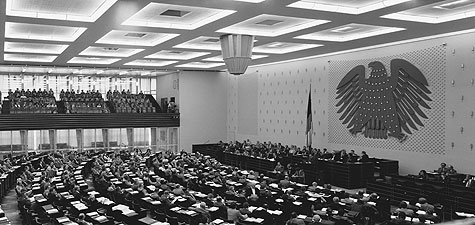Navigationpath: Homepage > Art and History > History > German parliamentarism
The Federal Republic of Germany

The plenary chamber of the German Bundestag in Bonn during the debate of 21 June 1977. CSU politician Franz-Josef Strauss addresses the House. © dpa - Bildarchiv
When the Parliamentary Council adopted the Basic Law for the Federal Republic of Germany on 8 May 1949, it set the compass for a stable parliamentary system of government. This was by no means a foregone conclusion. The failure of the Weimar Republic was also the failure of a parliamentary system. Moreover, there was a legacy of anti-parliamentarian traditions in Germany.
A strong parliament
For this reason, the Basic Law assigned key rights and functions to Parliament. For example, the German Bundestag is the only organ of the Constitution that is directly elected by the people; it is the task of Parliament to elect the Federal Chancellor; lastly, the Basic Law places special emphasis on the functions of political parties. Whereas the Weimar Constitution gave the President and Parliament of the Reich concurrent powers to appoint and dismiss the Chancellor, the Basic Law considerably curtailed the rights of the Federal President in favour of the German Bundestag. Under Article 67, the Chancellor may be voted out of office by the German Bundestag only if it elects a new Chancellor; this process is known as the constructive vote of no confidence.
The safeguards written into the Basic Law to favour a strong parliament and stable majorities are the result of historical experience gained in both the Empire and the Weimar Republic. The German Bundestag has never been plagued by chronically fragile coalitions and powerless chancellors. Its power to scrutinise the Government and to co-govern reflects a historically conditioned shift in the distribution of roles between the Government, Parliament and the Head of State.
Elections
Since 1949, voters in the Federal Republic have elected the German Bundestag for four-year terms by secret ballot in general, direct and free elections based on the principle of equal voting rights. Since the second general election in 1953, voters have cast a first vote to elect a constituency candidate and a second vote for the regional list of candidates nominated by their preferred party. In contrast to all subsequent elections, voters in the 1949 election had only one vote; a vote cast in favour of a constituency candidate counted as a vote for the regional list of the candidate’s party.
At the present time the Bundestag has 622 members. In 1953, the cut-off clause, whereby no candidates from a party list could enter Parliament unless the party won 5% of the overall vote, was introduced as a barrier to the parliamentary presence of splinter parties in order to make it easier to form parliamentary majorities. The inaugural sitting of the newly elected German Bundestag in Bonn on 7 September 1949 marked the real start of the active statehood of our Republic.
Political parties
Even in those early days, the proper functioning of the parliamentary system of government in the Federal Republic depended on the effectiveness of the political parties. Article 21 of the Basic Law contained the first enshrinement of the significance of political parties in a German constitution. When new parties were founded and old parties re-established, efforts were made to form broad political movements as an antidote to the splintering and subsequent weakness of the parties in the Weimar Republic. One of the methods used to prevent splintering was the creation of mass parties that no longer represented only the interests of particular groups such as farmers, large landowners, Catholics or civil servants. Middle-class Catholics and Protestants and adherents of Christian social movements gravitated towards the Christian Democratic Union (CDU) and the Christian Social Union (CSU). The Social Democratic Party of Germany (SPD) developed into a mass party after the adoption of its Godesberg Programme in 1959, if not before. Advocates of liberal ideas founded the Free Democratic Party (FDP). The CDU and CSU, which have formed a single parliamentary group since 1949, the SPD and the FDP have been represented in the German Bundestag ever since the first parliamentary elections. The 1970s saw the development of the ecologist movement, which culminated in the creation of a federal political party, The Greens, in 1980. The Greens’ entry to the German Bundestag in 1983 posed a challenge to the increasingly cross-party approach to parliamentary business that had developed behind the scenes since the mid-1950s. A transitional phase during which the established groups tended to marginalise the Greens, while the latter adopted a critical attitude to the workings of Parliament, was eventually followed by the parliamentarisation and integration of the Greens; the same process took place in the case of the Party of Democratic Socialism (PDS) - now part of The Left Party - after the unification of Germany.
Everyday parliamentary life is based on business conducted on the basis of a division of labour. Because of the huge number of problems that need to be solved, specialisation is required on the part of Members of Parliament, who increasingly match the profile of the full-time professional politician. The professionalisation of the business of politics is partly the result of legitimate public demand for an efficient Parliament.

